We Are Family

Researchers have discovered that humans and chimpanzees have something in common when it comes to adopting infants.
New research, carried out by University of St Andrews psychologists Dr Catherine Hobaiter and Professor Klaus Zuberbühler, reveals the different types of adoption seen in wild chimpanzees across Africa.
The researchers combined their own observations of adoptions in the Sonso chimpanzee community in Uganda, with long-term published records from chimpanzee sites across Africa, revealing, for the first time, that being adopted significantly benefits orphaned chimpanzees chances of survival.
The research shows that where no mother is present, maternal siblings, even those that are very young, adopt their younger brothers and sisters, becoming ‘Baudelaire’ families of young orphans. Where no maternal siblings are present, unrelated adults will adopt an orphan in their community – but only after a long period of time; once a social bond has developed.
The adoptive ‘parents’ were shown to carry the young infants, wait for them while travelling, share food with them, and even stick up for them during fights.
Dr Hobaiter explains:
“It may sound obvious – that adoption is beneficial – but in previous work in West Africa the overall chimpanzee survival rates were so low that it was hard to demonstrate this. By looking at data across several long-term sites, including our own in Uganda, we were able to show that being adopted, even by a juvenile brother or sister, increased a young orphan’s chance of survival.
Crucially, it appears to be the social bonds between individuals, rather than just biological relatedness, that are key to the adoption process. Wild chimpanzees remain with their mothers until maturity, but spend very little time with their fathers. As a result, while they are equally related to their siblings through either their mother or father – they only develop strong social bonds with their maternal brothers and sisters, and it is only between these maternal siblings that adoptions occur. The delay that tends to happen before unrelated individuals adopt an orphan may occur because of the extra time it takes for new social bonds to develop between the orphan and others in their community.”
The research paper, ‘’Adoption’ by maternal siblings in wild chimpanzees’ is published by PLoS One and can be viewed here.
The work was carried out by Dr Catherine Hobaiter and Professor Klaus Zuberbühler of the University of St Andrews, together with colleagues at the Institute Jean Nicod at the Ecole Normale Superieure, Paris and the Max Plank Institute for Evolutionary Anthropology, in Leipzig.
ENDS
NOTES TO EDITORS
THE RESEARCHERS ARE AVAILABLE FOR INTERVIEW:
Dr Hobaiter: [email protected] , via twitter on @nakedprimate , or by phone or whatsapp on 077 62816379. Skype interview can also be arranged by appointment.
NOTE TO PICTURE / NEW MEDIA EDITORS:
A selection of images are available from the University of St Andrews Press Office. Contact [email protected] or telephone 01334 462 530.
Issued by the University of St Andrews Press Office
Contact Victoria Herd on 01334 462530 or email [email protected]
Ref: (chimpadopt050814)
View the University’s latest news at http://www.st-andrews.ac.uk/news/
Category Research